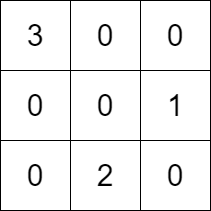Problem
You are given a positive integer k. You are also given:
a 2D integer array
rowConditionsof sizenwhererowConditions[i] = [abovei, belowi], anda 2D integer array
colConditionsof sizemwherecolConditions[i] = [lefti, righti].
The two arrays contain integers from 1 to k.
You have to build a k x k matrix that contains each of the numbers from 1 to k exactly once. The remaining cells should have the value 0.
The matrix should also satisfy the following conditions:
The number
aboveishould appear in a row that is strictly above the row at which the numberbelowiappears for allifrom0ton - 1.The number
leftishould appear in a column that is strictly left of the column at which the numberrightiappears for allifrom0tom - 1.
Return *any matrix that satisfies the conditions*. If no answer exists, return an empty matrix.
Example 1:

Input: k = 3, rowConditions = [[1,2],[3,2]], colConditions = [[2,1],[3,2]]
Output: [[3,0,0],[0,0,1],[0,2,0]]
Explanation: The diagram above shows a valid example of a matrix that satisfies all the conditions.
The row conditions are the following:
- Number 1 is in row 1, and number 2 is in row 2, so 1 is above 2 in the matrix.
- Number 3 is in row 0, and number 2 is in row 2, so 3 is above 2 in the matrix.
The column conditions are the following:
- Number 2 is in column 1, and number 1 is in column 2, so 2 is left of 1 in the matrix.
- Number 3 is in column 0, and number 2 is in column 1, so 3 is left of 2 in the matrix.
Note that there may be multiple correct answers.
Example 2:
Input: k = 3, rowConditions = [[1,2],[2,3],[3,1],[2,3]], colConditions = [[2,1]]
Output: []
Explanation: From the first two conditions, 3 has to be below 1 but the third conditions needs 3 to be above 1 to be satisfied.
No matrix can satisfy all the conditions, so we return the empty matrix.
Constraints:
2 <= k <= 4001 <= rowConditions.length, colConditions.length <= 10^4rowConditions[i].length == colConditions[i].length == 21 <= abovei, belowi, lefti, righti <= kabovei != belowilefti != righti
Solution
class Solution {
List<Integer>[] al;
public int[][] buildMatrix(int k, int[][] rc, int[][] cc) {
int ans[][] = new int[k][k];
this.al = new ArrayList[k+1];
for(int i=0;i<=k;i++) al[i] = new ArrayList<>();
for(int r[] : rc) al[r[0]].add(r[1]);
boolean[] vis = new boolean[k+1];
boolean dfsvis[] = new boolean[k+1];
List<Integer> rowStack = new ArrayList<>();
for(int node=1;node<=k;node++){
if(!vis[node]) {
if(!dfs(node,vis,rowStack,dfsvis)) return new int[0][0];
}
}
for(int i=0;i<=k;i++) al[i] = new ArrayList<>();
for(int c[] : cc) al[c[0]].add(c[1]);
List<Integer> colStack = new ArrayList<>();
vis = new boolean[k+1];
dfsvis = new boolean[k+1];
for(int node=1;node<=k;node++){
if(!vis[node]) {
if(!dfs(node,vis,colStack,dfsvis)) return new int[0][0];
}
}
HashMap<Integer,Integer> map = new HashMap<>();
for(int i=0;i<colStack.size();i++){
map.put(colStack.get(i),i);
}
int row = 0;
for(int i=rowStack.size()-1;i>=0;i--){
// should place this value leaving required cells ahead for other values to come to make column condition true.
ans[row++][k-map.get(rowStack.get(i))-1] = rowStack.get(i);
}
return ans;
}
// toposort dfs along with cycle check (returns false if cycle exists)
private boolean dfs(int node,boolean[] vis,List<Integer> stack,boolean[] dfsvis){
vis[node] = true;
dfsvis[node] = true;
for(int next : al[node]){
if(!vis[next]) {
if(!dfs(next,vis,stack,dfsvis)) return false;
}else if(dfsvis[next]) return false;
}
stack.add(node);
dfsvis[node] = false;
return true;
}
}
Explain:
nope.
Complexity:
- Time complexity : O(n).
- Space complexity : O(n).